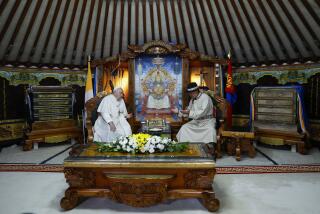The Dalai Lama on Faith in a Changing World
- Share via
Since he fled Tibet for exile in India in 1959, the Dalai Lama, spiritual head of Tibetan Buddhism, has waged a relentless international campaign for the religious and political rights of his people. On a recent visit to Mongolia--his first since restoration of religious freedom in that nation after decades of Communist dictatorship--the Dalai Lama spoke with Times Beijing Bureau Chief David Holley about the future of Buddhism and communism . Excerpts from the interview:
Question: What is most significant about your visit to Mongolia?
Answer: You know, when I first visited in 1979, I was very much impressed at how strong was the influence of the past . . . the long cultural closeness with Tibet. At that time . . . wherever I go . . . the people . . . rushed to come to see me, and to touch. The next day, clearly, already there were some instructions. These people could not move. They just remained in a certain area, like dolls. No expression. The only expression was in their eyes. Even in such a situation they clearly expressed their feelings.
So, times change. Now there is more freedom to express that deep feeling. So, naturally I come. It is a good opportunity to meet them. This time, the government at least made it convenient. So I came. I’m very happy to be here once more and meet people freely.
Q. You will be going to Lithuania from here. What is the meaning for Tibet of Baltic independence and of the renewal of Buddhism in Mongolia?
A. Directly and immediately, nothing much. You know, in spite of the big changes in neighboring states, the Chinese government is following very strictly their own views, their own beliefs. So, it seems they are genuine followers of (Soviet founder V.I.) Lenin. Despite any problem, they sincerely follow their teacher’s teaching. They are very faithful, I think. Therefore, I think, due to these events, China will be even tougher. In Tibet also, now the Chinese take even more precautions.
In the long run, there is no doubt the recent events in most of the Communist countries, and particularly the recent events in Moscow, are having a tremendous impact on Chinese minds and the Chinese leadership. I think especially for those younger, more open-minded, more reasonable people or more intellectual types, naturally it creates an incredible impact on their minds. . . .
Faith is very difficult to eliminate. Under difficult circumstances, faith helps to sustain hope. So, recent events I think taught a great lesson to people in China. In the long run, definitely, it is positive.
In Tibet, the Chinese have put so many restrictions on Buddhism. So, much effort has been done to eliminate the Buddhist faith. Now, these recent events clearly demonstrated their effort is useless.
Q. You have said that it is important to make a plan for the development of Buddhism. What do you mean?
A. In the past, Buddhist institutions carried an important role in our society. However, that society is now completely changed. In the future, I’m quite sure the Buddhist role in our country will be important and positive. However, because of new circumstances, we should change deeply and properly.
First, the standard of knowledge about Buddhism should be increased. In the past, the general public was contented to claim themselves as Buddhist. Actually, they had very little knowledge. As general education improves, education involving Buddhism also should improve. The second thing, I personally think the number of monks and nuns may be better with lesser numbers and good quality. And there should be more participation of monks and nuns in social services, education and health. Then, the monastic institutions, I have no doubt, need some change. Now, already, in India, the monks and nuns in the monasteries already are something like self-sufficient. In the future, this practice must continue in our own land.
Q. With so many of your followers here, have you considered moving from Dharmsala (the headquarters of Tibetan exiles in India) to Mongolia?
A. I don’t think (that way). We will remain in India. But one thing--because of the new situation here, if the government finds it convenient, then my visits will be more often and the duration may be longer.
More to Read
Sign up for Essential California
The most important California stories and recommendations in your inbox every morning.
You may occasionally receive promotional content from the Los Angeles Times.










